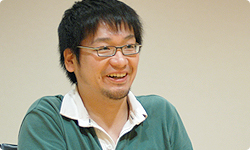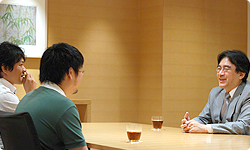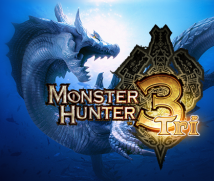6. A World in Flux
Another big appeal of the Monster Hunter series is going online and hunting together with your friends. I suppose there’s a chance some players will hesitate to do that.
Yes, but when you’re connected to the network and your friends who have gone hunting are fighting monsters, you can read the chat messages, such as “Flash Bombs work against this monster” and “It doesn’t work to drop this one in a pit.” So even if you’re off fishing alone, you’re taking in information from skillful players.
Oh, I see. You can learn about hunting even while you’re fishing. (laughs)
So the next time you participate in the hunt, you think, “Oh, that’s right, they said Flash Bombs work…” (laughs)
Then when you go on a hunt and try it out, it must feel great to see it work.
I think so.
This software is good for skillful players to share their knowledge with beginners.
You want to share the fun you’ve experienced with all your friends.
Like, “At first it’s all right to just go fishing, but next time let’s take on some monsters together.”
“Next time I’ll let you deal the finishing blow.” (laughs)
Right! Like that! (laughs) Besides, if you go hunting and get hit by a monster, a good player will skillfully help you out, like, “I’ll distract it!” or “Heal yourself now!” In that way, everyone cooperates with each other, so people who aren’t very good at first will gradually get better. Then, before you know it, you’re good at action games. As you build up experience, you’ll be able to do something really impressive. (laughs)

Your comrades in hunting are your instruction manual, your strategy guide. Even if you play without reading the instruction booklet, everyone will teach you all kinds of things.
That’s a good thing about online games.
I suppose it’s like that because Monster Hunter Tri is structured for cooperative play. If players fought and competed against each other, a lot of their energy would go into keeping others down.
Besides, if you take some kind of action, it isn’t just you who benefits…
It’s everyone, right? Game theory-wise, I’d say it’s extremely well-structured.
There’s nothing negative about participating. Everything comes back to you in the form of a positive. The degree of the positives changes with the odds.
So it’s okay to mess up. I think it’s great to have a world where everyone laughs and gets along whether they fail or succeed. When we were still developing it and I saw the test players trying it out, that was what I noticed more than anything. Even when someone said, “Aw, I messed up,” they said it with a smile.
When you see that, you think, “We did well.”
Yeah. When it isn’t all right not to succeed, that creates a lot of pressure. You don’t want to go online.
The freedom to fail is very important. Without it, the game gets depressing.
Many people who aren’t very good at games don’t want to cause the other players trouble or fall behind the others.
If it were structured so that when you beat a monster, the most agile person was able to gather up all the rewards, not that many people would have played this game.
If you structured it to be a competition for first, it would get brutal. We didn’t want to do that. When we started work on the Monster Hunter series, most online games at the time were about trading items. A certain enjoyment could be derived from giving to others or receiving yourself, but contrary to that, we decided to make it so that basically when you receive something, the participants get it randomly. Then when we decided to structure it so that only the person who received it could use it, collaborative play became firmly established and it became an easy game to invite people to play.
One important condition for something to spread is how easy it is to invite others to join. I think Monster Hunter’s structure is incredibly well-designed in that respect.
Thank you very much. The basic elements work well, I think.
While Monster Hunter Tri is a game that can be broken down into short sessions, really dedicated Monster Hunter players will spend hundreds, if not thousands, of hours playing. Why do you think people play it for so long?
At first, I thought that if a lot is built into a game, people will spend more time playing it.
Right, that’s what you would normally think. There’s a lot there, so you play a lot. If there are a lot of scenarios and stages, you can play the game for a long time. That is the general way of thinking within the gaming industry that has caused game volume to inflate.

But I realised that’s not true when I saw the recent phenomenon of the portable series. It really doesn’t have the volume for playing thousands of hours. When I saw those who were playing that long, they were doing the same things over and over again. They do gain some kind of materials as a result, but they’re not playing because of that. I feel like they keep playing for hours on end because they simply like playing with their friends.
In other words, their motivation isn’t playing a new scenario, advancing towards some kind of ending, or getting a new weapon. Lots of people play Monster Hunter games for thousands of hours because playing together with their friends in the world of Monster Hunter is fun.
I think so.
So what have you prepared in Tri for those players who want to go at it for long periods of time?
We put in a sort of “flux,” so when players play the same quest more than once, they’ll think, “It was like such-and-such last time, but this time it’s a little different.”
“Flux”? You mean slight changes?
Yes. When you enter the same place, maybe there wasn’t anything there before, but now there is, so let’s check it out. Or there was only one monster before, but for some reason there are two now. Changes occur little by little. But it doesn’t occur consistently and according to a fixed plan. Certain little elements move randomly.
Oh, I see. So if you return to the same place repeatedly, something different might happen, which keeps things feeling fresh and alive.
